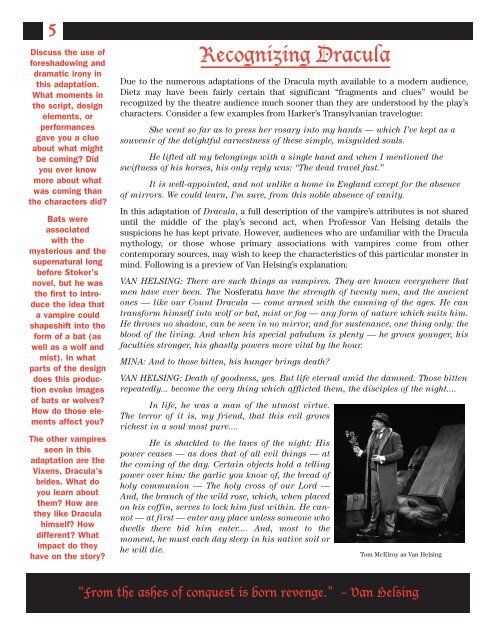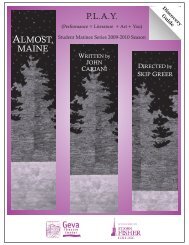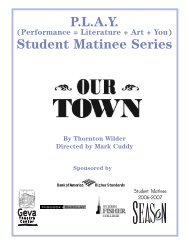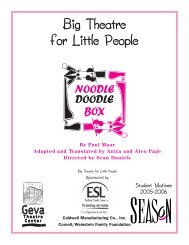Written by Steven Dietz Directed by Peter Amster - Geva Theatre
Written by Steven Dietz Directed by Peter Amster - Geva Theatre
Written by Steven Dietz Directed by Peter Amster - Geva Theatre
You also want an ePaper? Increase the reach of your titles
YUMPU automatically turns print PDFs into web optimized ePapers that Google loves.
5<br />
Discuss the use of<br />
foreshadowing and<br />
dramatic irony in<br />
this adaptation.<br />
What moments in<br />
the script, design<br />
elements, or<br />
performances<br />
gave you a clue<br />
about what might<br />
be coming? Did<br />
you ever know<br />
more about what<br />
was coming than<br />
the characters did?<br />
Bats were<br />
associated<br />
with the<br />
mysterious and the<br />
supernatural long<br />
before Stoker's<br />
novel, but he was<br />
the first to introduce<br />
the idea that<br />
a vampire could<br />
shapeshift into the<br />
form of a bat (as<br />
well as a wolf and<br />
mist). In what<br />
parts of the design<br />
does this production<br />
evoke images<br />
of bats or wolves?<br />
How do those elements<br />
affect you?<br />
The other vampires<br />
seen in this<br />
adaptation are the<br />
Vixens, Dracula’s<br />
brides. What do<br />
you learn about<br />
them? How are<br />
they like Dracula<br />
himself? How<br />
different? What<br />
impact do they<br />
have on the story?<br />
Recognizing Dracula<br />
Due to the numerous adaptations of the Dracula myth available to a modern audience,<br />
<strong>Dietz</strong> may have been fairly certain that significant “fragments and clues” would be<br />
recognized <strong>by</strong> the theatre audience much sooner than they are understood <strong>by</strong> the play’s<br />
characters. Consider a few examples from Harker’s Transylvanian travelogue:<br />
She went so far as to press her rosary into my hands — which I’ve kept as a<br />
souvenir of the delightful earnestness of these simple, misguided souls.<br />
He lifted all my belongings with a single hand and when I mentioned the<br />
swiftness of his horses, his only reply was: “The dead travel fast.”<br />
It is well-appointed, and not unlike a home in England except for the absence<br />
of mirrors. We could learn, I’m sure, from this noble absence of vanity.<br />
In this adaptation of Dracula, a full description of the vampire’s attributes is not shared<br />
until the middle of the play’s second act, when Professor Van Helsing details the<br />
suspicions he has kept private. However, audiences who are unfamiliar with the Dracula<br />
mythology, or those whose primary associations with vampires come from other<br />
contemporary sources, may wish to keep the characteristics of this particular monster in<br />
mind. Following is a preview of Van Helsing’s explanation:<br />
VAN HELSING: There are such things as vampires. They are known everywhere that<br />
men have ever been. The Nosferatu have the strength of twenty men, and the ancient<br />
ones — like our Count Dracula — come armed with the cunning of the ages. He can<br />
transform himself into wolf or bat, mist or fog — any form of nature which suits him.<br />
He throws no shadow, can be seen in no mirror, and for sustenance, one thing only: the<br />
blood of the living. And when his special pabulum is plenty — he grows younger, his<br />
faculties stronger, his ghastly powers more vital <strong>by</strong> the hour.<br />
MINA: And to those bitten, his hunger brings death?<br />
VAN HELSING: Death of goodness, yes. But life eternal amid the damned. Those bitten<br />
repeatedly... become the very thing which afflicted them, the disciples of the night....<br />
In life, he was a man of the utmost virtue.<br />
The terror of it is, my friend, that this evil grows<br />
richest in a soul most pure....<br />
He is shackled to the laws of the night: His<br />
power ceases — as does that of all evil things — at<br />
the coming of the day. Certain objects hold a telling<br />
power over him: the garlic you know of, the bread of<br />
holy communion — The holy cross of our Lord —<br />
And, the branch of the wild rose, which, when placed<br />
on his coffin, serves to lock him fast within. He cannot<br />
— at first — enter any place unless someone who<br />
dwells there bid him enter.... And, most to the<br />
moment, he must each day sleep in his native soil or<br />
he will die.<br />
Tom McElroy as Van Helsing<br />
“From the ashes of conquest is born revenge.” – Van Helsing





